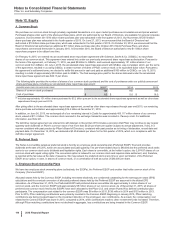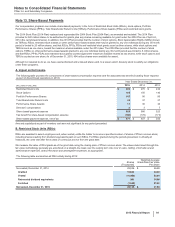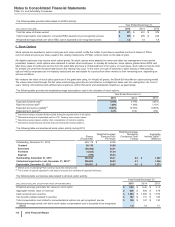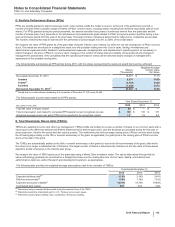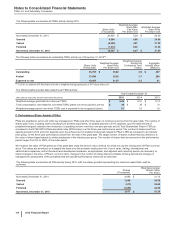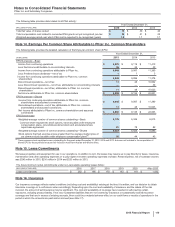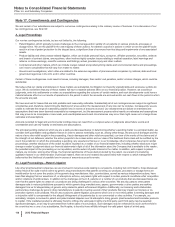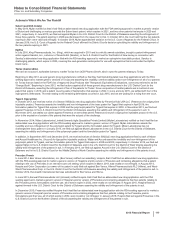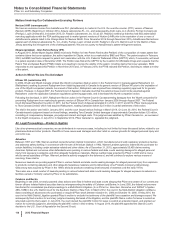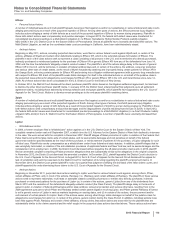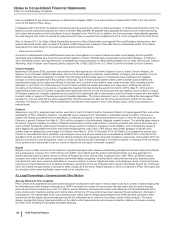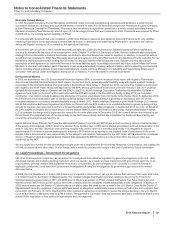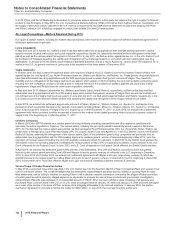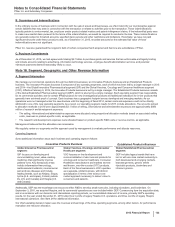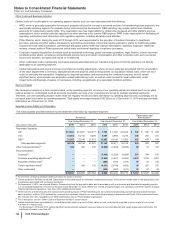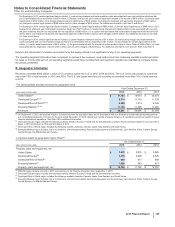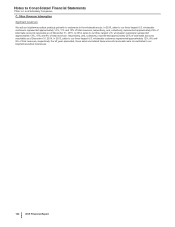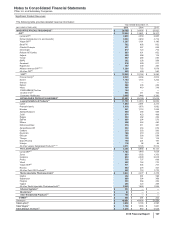Pfizer 2015 Annual Report Download - page 121
Download and view the complete annual report
Please find page 121 of the 2015 Pfizer annual report below. You can navigate through the pages in the report by either clicking on the pages listed below, or by using the keyword search tool below to find specific information within the annual report.
Notes to Consolidated Financial Statements
Pfizer Inc. and Subsidiary Companies
120
2015 Financial Report
been consolidated for pre-trial proceedings in a Multi-District Litigation (MDL) (In re Lipitor Antitrust Litigation MDL-2332) in the U.S. District
Court for the District of New Jersey.
In September 2013 and 2014, the District Court dismissed with prejudice the claims by direct purchasers. In October and November 2014, the
District Court dismissed with prejudice the claims of all other MDL plaintiffs. All plaintiffs have appealed the District Court’s orders dismissing
their claims with prejudice to the United States Court of Appeals for the Third Circuit. In addition, the direct purchaser class plaintiffs appealed
the order denying their motion to amend the judgment and for leave to amend their complaint to the U.S. Court of Appeals for the Third Circuit.
Also, in January 2013, the State of West Virginia filed an action in West Virginia state court against Pfizer and Ranbaxy, among others, that
asserts claims and seeks relief on behalf of the State of West Virginia and residents of that state that are substantially similar to the claims
asserted and the relief sought in the purported class actions described above.
• Personal Injury Actions
A number of individual and multi-plaintiff lawsuits have been filed against us in various federal and state courts alleging that the plaintiffs
developed type 2 diabetes as a result of the purported ingestion of Lipitor. Plaintiffs seek compensatory and punitive damages. In February
2014, the federal actions were transferred for consolidated pre-trial proceedings to a Multi-District Litigation (In re Lipitor (Atorvastatin Calcium)
Marketing, Sales Practices and Products Liability Litigation (No. II) MDL-2502) in the U.S. District Court for the District of South Carolina.
Chantix/Champix
Beginning in December 2008, purported class actions were filed against us in the Ontario Superior Court of Justice (Toronto Region), the
Superior Court of Quebec (District of Montreal), the Court of Queen’s Bench of Alberta, Judicial District of Calgary, and the Superior Court of
British Columbia (Vancouver Registry) on behalf of all individuals and third-party payers in Canada who have purchased and ingested
Champix or reimbursed patients for the purchase of Champix. Each of these actions asserts claims under Canadian product liability law,
including with respect to the safety and efficacy of Champix, and, on behalf of the putative class, seeks monetary relief, including punitive
damages. In June 2012, the Ontario Superior Court of Justice certified the Ontario proceeding as a class action, defining the class as
consisting of the following: (i) all persons in Canada who ingested Champix during the period from April 2, 2007 to May 31, 2010 and who
experienced at least one of a number of specified neuropsychiatric adverse events; (ii) all persons who are entitled to assert claims in respect
of Champix pursuant to Canadian legislation as the result of their relationship with a class member; and (iii) all health insurers who are entitled
to assert claims in respect of Champix pursuant to Canadian legislation. The Ontario Superior Court of Justice certified the class against Pfizer
Canada Inc. only and ruled that the action against Pfizer should be stayed until after the trial of the issues that are common to the class
members. The actions in Quebec, Alberta and British Columbia have been stayed in favor of the Ontario action, which is proceeding on a
national basis.
Celebrex
Beginning in July 2014, purported class actions were filed in the U.S. District Court for the Eastern District of Virginia against Pfizer and certain
subsidiaries of Pfizer relating to Celebrex. The plaintiffs seek to represent U.S. nationwide or multi-state classes consisting of persons or
entities who directly purchased from the defendants, or indirectly purchased or reimbursed patients for some or all of the purchase price of,
Celebrex or generic Celebrex from May 31, 2014 until the cessation of the defendants’ allegedly unlawful conduct. The plaintiffs allege delay in
the launch of generic Celebrex in violation of federal antitrust laws or certain state antitrust, consumer protection and various other laws as a
result of Pfizer fraudulently obtaining and improperly listing a patent on Celebrex, engaging in sham litigation, and prolonging the impact of
sham litigation through settlement activity that further delayed generic entry. Each of the actions seeks treble damages on behalf of the
putative class for alleged price overcharges for Celebrex since May 31, 2014. In December 2014, the District Court granted the parties’ joint
motions to consolidate the direct purchaser and end-payer cases, and all such cases were consolidated as of March 2015. In October 2014
and March 2015, we filed motions to dismiss the direct purchasers’ and end-payers’ amended complaints, respectively. In November 2015, the
District Court denied in part and granted in part our motion to dismiss the direct purchasers’ amended complaint. In February 2016, the District
Court denied in part and granted in part our motion to dismiss the end-payers’ amended complaint.
Reglan
Reglan is a pro-motility medicine for the treatment of gastroesophageal reflux disease and diabetic gastroparesis that was marketed by Wyeth
and a predecessor company from 1979 until the end of 2001, when Wyeth sold the product and transferred the new drug application to
another pharmaceutical company. Generic versions of Reglan have been sold by other companies since 1985. Pfizer, as Wyeth’s parent
company, and certain wholly-owned subsidiaries and limited liability companies, including Wyeth, along with several other pharmaceutical
manufacturers, have been named as defendants in numerous actions in various federal and state courts alleging a variety of personal injuries,
including movement disorders such as Tardive Dyskinesia, resulting from the use of Reglan and/or generic equivalents thereof. As of February
2016, we entered into agreements in principle to settle virtually all of the known Reglan lawsuits on terms not material to Pfizer. We expect that
the resolution of the remaining Reglan cases would not be material to us.
A3. Legal Proceedings––Commercial and Other Matters
Average Wholesale Price Litigation
Pfizer, certain of its subsidiaries and other pharmaceutical manufacturers were sued in various state courts by a number of states alleging that
the defendants provided average wholesale price (AWP) information for certain of their products that was higher than the actual average
prices at which those products were sold. The AWP is used to determine reimbursement levels under Medicare Part B and Medicaid and in
many private-sector insurance policies and medical plans. All but one of those actions have been resolved through settlement, dismissal or
final judgment. The plaintiff state in the one remaining action claims that the alleged spread between the AWPs at which purchasers were
reimbursed and the actual sale prices was promoted by the defendants as an incentive to purchase certain of their products. The action
alleges, among other things, fraud and violation of the state’s unfair trade practices and consumer protection statutes, and seeks monetary
and other relief, including civil penalties and treble damages.


